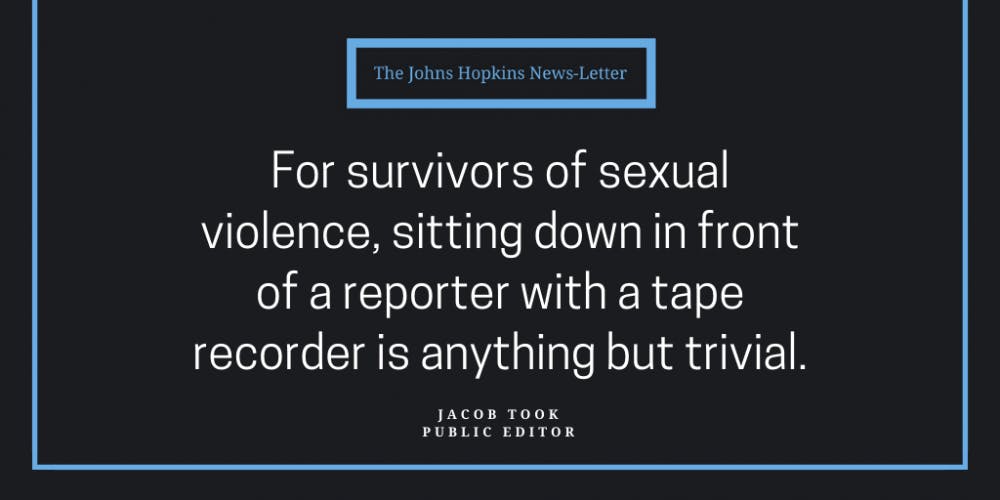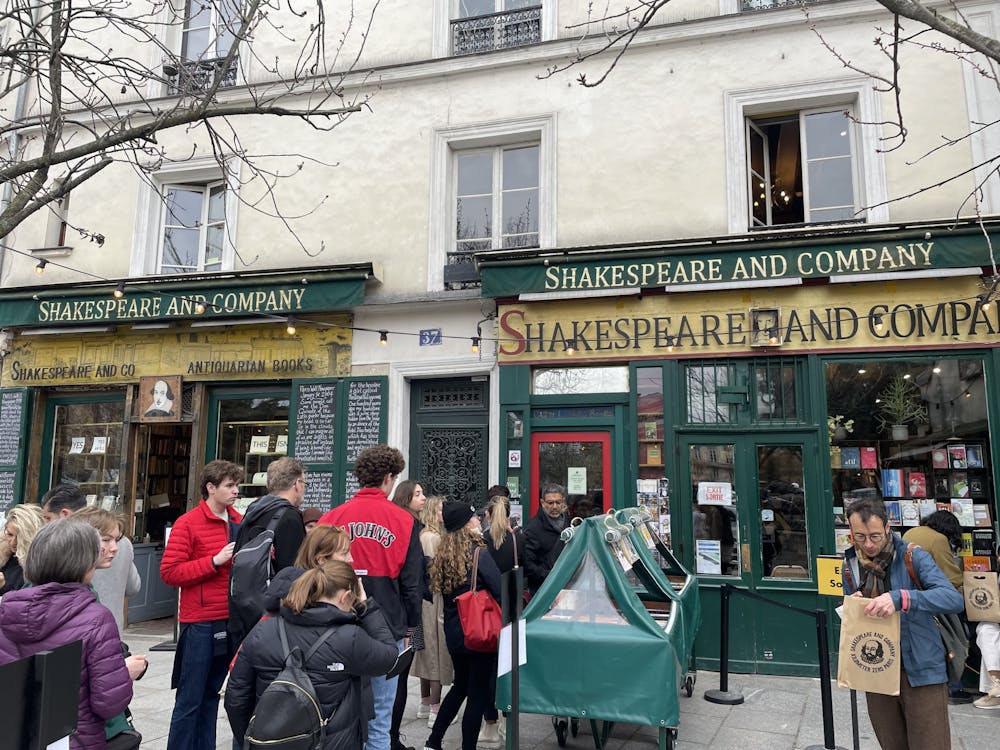
Four and a half years ago, the University shut down the Hopkins chapter of Sigma Alpha Epsilon after reports of sexual assault at one of the fraternity’s parties. In an editorial headlined “SAE suspension wrong, requires reversal,” The News-Letter called the decision “draconian,” prompting understandable pushback from readers.
Three years later, the paper published “On their own,” in which eight students shared their experiences with sexual violence on campus, alongside a damning editorial headlined “The Office of Institutional Equity’s failed promises.”
In the year and a half since The News-Letter published those pieces in April 2018, readers have often observed more sensitive representations of survivors’ narratives in recent coverage. So what changed behind the scenes, and what does the conversation about representing sexual violence in The News-Letter look like today?
I had a chance to address those questions when the University released a second annual report on the Office of Institutional Equity (OIE), along with the results of a campus-wide survey on sexual assault, last Tuesday, Oct. 15. Two days later, The News-Letter published news coverage of the report alongside an editorial which both commends steps to improve OIE’s operations and points out ongoing and new concerns that arise from the most recent data.
Last week’s coverage doesn’t feature any students sharing their experiences as survivors, and I wouldn’t necessarily have expected it to — bringing those perspectives into a piece respectfully takes time, patience and thorough editing. News Editor Will Edmonds explained to me that, with little more than a day after the University released the report, he originally intended his piece to be a brief — industry slang for a short piece, usually under 500 words, which typically features a pretty narrow scope of reporting.
I’ve written briefs based around a single email. Edmonds took an extra step and reached out to Reah Vasilakopoulos and Deeya Bhattacharya, the co-heads of the Sexual Assault Resource Unit (SARU), who shared their thoughts alongside a comment from Interim Vice Provost for Institutional Equity Joy Gaslevic. While he said that The News-Letter can offer survivors an important platform to share their voices, Edmonds worried that a shorter piece focusing on trends in data was the wrong place to spotlight survivors’ voices.
“It’s critical to consider the trendlines and datasets as only one part of the conversation on sexual misconduct and assault. There’s another vital component that should be emphasized — the individual truths and experiences of sexual assault survivors,” Edmonds said. “I felt that this piece on sexual misconduct data reports would not be able to do justice to the voices of survivors while still maintaining its intended angle.”
I sat down with Vasilakopoulos and Bhattacharya to learn more about the complications media attention on survivors can bring. “Sharing someone’s story — it can affect every aspect of their life,” Bhattacharya stressed to me across a rickety table in Brody Cafe.
This gets to the core of the complexity — in my one year as a news editor, I edited dozens of articles with hundreds of sources. Talking to me (or whichever News-Letter reporter) was probably trivial for most of those people, a few minutes at the end of an event or a 15-minute study break in the café. But for survivors of sexual violence, sitting down in front of a reporter with a tape recorder is anything but trivial.
What does that moment feel like? I asked Diva Parekh, the writer of “On their own” who went on to become a news editor, to tell me more about what she learned from interviews with eight survivors. She explained that the most important thing for her to keep in mind was trust — she worked hard to reassure her sources that they could trust her.
“The act of sexual violence and the violation of consent can often cause survivors to feel like they’re losing control of their own lives — as a survivor myself, that’s something I went through too,” Parekh said. “In my reporting, I tried to do everything possible to show them that I was someone they could trust with their stories.”
Her experiences reporting “On their own” led Parekh to create guidelines for conducting sensitive interviews which she passed down to this year’s news editors. Many of the guidelines — maintain eye contact, don’t interrupt, ask clarifying questions rather than probing questions — reflect ways reporters can work to build trust.
Adhering to these guidelines, and building on journalistic best practice, means that respectfully representing survivors doesn’t happen overnight. Edmonds had to get a quick comment, and while both Vasilakopoulos and Bhattacharya said they would have liked more time to process the full report, Bhattacharya added she was glad Edmonds contacted SARU for his piece because the group is uniquely positioned to speak on the subject as an intermediary between survivors on campus and the administration.
Speaking beyond last week’s coverage, Vasilakopoulos called for more sensitivity around representations of sexual violence across The News-Letter. “There’s always another level of responsibility, whether it’s on this campus or larger, to think about the ways that rape culture itself is very insidious,” she said.
Authority to check for sensitive language around sexual violence falls on the Editors-in-Chief, but opening up the conversation across the paper staff will help more editors feel ready to address the subject when it comes up in their own section.
Other editors commented on the complexities of representing sexual violence. Arts & Entertainment Editor Katy Oh addressed a recent article on Netflix’s Unbelievable, which suggests that the show isn’t for the faint of heart because of its frank depictions of sexual violence. The piece garnered pushback from readers and prompted Parekh to respond with a letter to the editor.
Oh said that when she edited the piece before it was published she was uncertain about how to make sensitive changes that didn’t undermine the writer’s voice. Going forward, she said, she would communicate more openly between writers and the Editors-in-Chief to clear up any uncertainties about sensitive content.
“This case really made me change the way in which I perceived my role as editor,” Oh said. “It is not only the writer’s responsibility to be conscientious of the way in which certain words hold weight, but also the role of the editor to determine whether or not a piece will contribute to productive and respectful dialogue.”
Her co-editor Jae Choi said that after the Unbelievable piece, he feels a sharper sense of responsibility to make sure the section addresses sexual violence sensitively.
“The last thing I would want for our readership is to leave them with discomfort and negative feelings,” Choi said. “I have learned that working with pieces that deal with topics such as sexual assault requires greater thoughtfulness and consideration towards readership.”
Voices Editor Sam Farrar encourages his writers, many of whom have shared personal experiences with sexual violence, to use the language they feel most accurately represents their narratives. He agreed that communication is the key to building trust with his writers.
“I want them to know that not only can what they’re writing be important to them, but it can also be extremely important for others as well,” Farrar said. “I also hope this shows them that I am with them 100 percent, in case they have any anxiety of blowback or negative responses.”
It’s good to see this year’s editors opening up that conversation, because it’s more important than ever that the paper represent survivors’ narratives thoughtfully. And no, I don’t mean because of the #MeToo movement or just generally heightened student activism on campus, but because the University is really trying to do a better job of supporting survivors. The report, and last week’s news coverage, make that clear. Parekh explained that The News-Letter could help administrators work to improve their practices.
"The reporting that The News-Letter does can help give administrators a roadmap to all the problems going on in their offices that they may not even personally be aware of," she added. "It can help them understand what it feels like to be in the survivors’ shoes and understand what they go through. And hopefully they can take that understanding and make changes.”
Vasilakopoulos pointed out that The News-Letter’s coverage has helped take the conversation beyond SARU’s network. “When OIE lost 18 reports because of the website malfunction, one of the first places that a lot of my friends heard about it was not me as the leader of SARU but from The News-Letter,” she said.
The SAE editorial may have faded from student memory (thank goodness), but survivors face a long history of being undermined, disbelieved or straight up ignored. As long as the issue persists on campus, The News-Letter must work to make more students aware of just how critical the issue is.
If you or someone you know has experienced sexual violence, you can seek help from the following Hopkins-specific, local or national confidential resources: JHU Sexual Assault Resource Unit (SARU) 24/7 Peer Crisis Support Hotline — (410) 516-7887; JHU 24/7 Sexual Assault Helpline — (410) 516-7333; TurnAround Inc 24/7 Helpline — (443) 279-0379; Rape, Abuse & Incest National Network (RAINN) 24/7 Sexual Assault Hotline — 1 (800) 656-4673.
We want you to be part of this conversation! We encourage all our readers, and particularly members of the Hopkins and Baltimore community, to email publiceditor@jhunewsletter.com with questions or comments about our practices and published content.
Editor’s Note: Diva Parekh’s comments have been lightly edited for clarity.
Correction: The original version of this article misstated the title of the Netflix show as Unbreakable. The correct title is Unbelievable. The News-Letter regrets this error.





